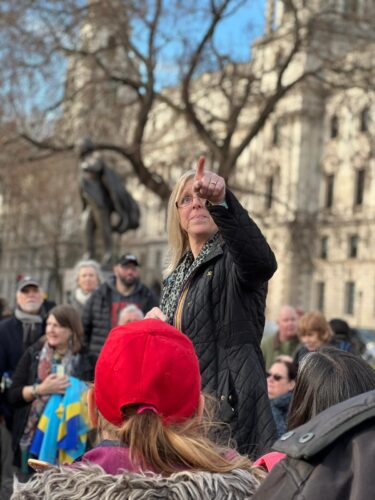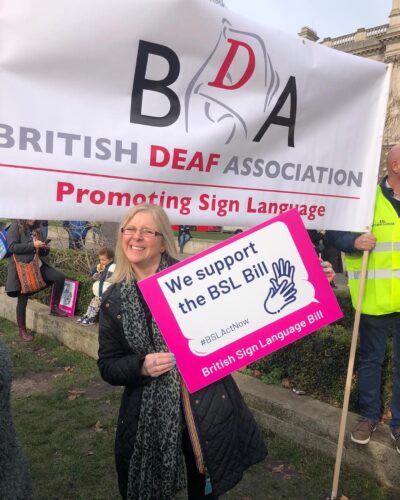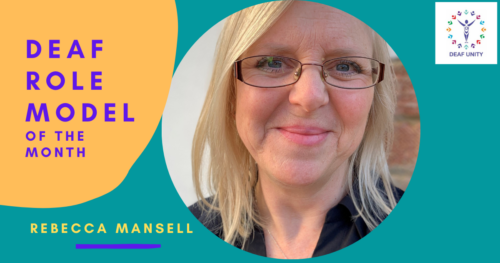Each month we invite an inspirational or outstanding deaf role model to share their story. From what they’ve learnt, to what they wish they’d have known and their best deaf tips.
Our role model this month is Rebecca Mansell. Chief Executive of the British Deaf Association. Rebecca has had a fascinating journey to her current role, exploring and discovering various parts of the deaf community and her identity. Enjoy the read.
1. Please tell us a little about yourself?
My name is Rebecca Mansell and I am the Chief Executive of the British Deaf Association. I started on 28th January 2022 when the BSL Bill was going through Parliament and my first day was spent on Parliament Square to hear the outcome of the 2nd reading. It was really exciting and I felt inspired.
I live in South East London. I’m married to Leo and have 2 CODA children. I grew up in Oxford and studied Biology at University. I became a Forensic Scientist, working for the Home Office specialising in DNA Analysis. After two years, I decided to travel the world and go to Australia and New Zealand, where secured a job at Auckland Deaf Society as a Fundraiser. I then carved out a career in Fundraising for the next 25 years. In 2021, I joined the Chartered Institute of Fundraising as an elected Trustee by their members.
2. Did you grow up in the Deaf Community or come to it later in life?
I became Deaf at 4 from meningitis. My parents took me to Oxford Deaf Club and I grew up with the Oxford Deaf community. I loved it and it is a special place to me. I went to Sir Winston Churchill School for the Deaf in London from 8 and then to Mary Hare for secondary school.
Even though I grew up in the Deaf community, I couldn’t sign. It wasn’t until I was 25 when I went travelling around the world that I met a group of Deaf people in Sydney. I then joined their Deaf Netball Team and developed AUSLAN. In New Zealand, working in the Deaf Club, my NZ Sign Language skills developed further and then when I returned home after 2 years, I worked for the RNID and met the late Richard Magill. It was he who honed by skills to BSL.
3. What was your experience of education and higher education as a deaf person?
I was lucky I had Marcel Hirshman at the same University (Staffordshire) as me and he could tell I was struggling in lectures. He suggested I went to the Disability Students office and ask for support. I was then provided with lipspeakers (as I couldn’t sign at the time) and then later I changed my support to BSL interpreters. I had a great time at University and made some lifelong friends. There were quite a few Deaf students so we had a ball.
4. You originally started work as a DNA Forensic Scientist, and then moved into a career in fundraising. Why the big change? What led you to move into a different career?
I was good at science at school and was encouraged to pursue a path in that direction. I didn’t know what I wanted to do at the time and enjoyed the ride. It was only when I worked as a Forensic Scientist and was stuck in the laboratory that I realised it was rather monotonous and repetitive. I accidentally came across the Fundraising vacancy at Auckland Deaf Society and I had one last remaining CV in my rucksack. It was fate and I loved it. I knew working with people was for me and then I returned home determined to work in the Deaf voluntary sector as a fundraiser.
5. Since then, you’ve worked with some brilliant deaf organisations, like RNID, deafPLUS, Sense International and SignHealth, and in impressive roles. What was your experience like moving into leadership roles as a deaf woman? Did you encounter many challenges?
I have been really fortunate to work with four great deaf organisations. I learnt so much over the years as I transitioned from management into leadership roles. My first leadership role was at SignHealth, however, the pandemic hit and it really tested me as a leader. It was tough working from home and switching to zoom. I struggled with the new way of working. However, I was really proud of how we launched BSL Health Access when the Deaf community was cut off from communicating with public services.
I’ve encountered many challenges as a manager and leader particularly when I became a mum. It felt like we had something to prove and I’ve had to work really hard to get to where I am now.
6. You are now CEO of the British Deaf Association (BDA) – one of the most famous leadership roles within the deaf community. What qualities do you think are important to make a good leader and role model?
 I think listening to our members has been key to me settling into the role. I am empathetic and my values are centred around inclusivity, transparency and engagement. I am open to taking on board feedback from members because they said the BDA is the only organisation that represents our language, BSL in the UK and BSL/ISL in Northern Ireland as well as holding international representation at the WFD, EUD, WFDYS and EUDY. So it was really important to me that I met with as many people as possible around the Country and to serve them.
I think listening to our members has been key to me settling into the role. I am empathetic and my values are centred around inclusivity, transparency and engagement. I am open to taking on board feedback from members because they said the BDA is the only organisation that represents our language, BSL in the UK and BSL/ISL in Northern Ireland as well as holding international representation at the WFD, EUD, WFDYS and EUDY. So it was really important to me that I met with as many people as possible around the Country and to serve them.
7. As CEO of BDA, you oversaw the BSL Act 2022. What was it like campaigning for such an important law? And how did it feel to achieve it?
 I can’t take credit for leading the BSL Act campaign. It was all down to the BDA’s former Chair of the Board of Trustees, David Buxton OBE. David launched the BSL Act Now! campaign in 2021 and I joined when the BSL Bill was already making its way through Parliament.
I can’t take credit for leading the BSL Act campaign. It was all down to the BDA’s former Chair of the Board of Trustees, David Buxton OBE. David launched the BSL Act Now! campaign in 2021 and I joined when the BSL Bill was already making its way through Parliament.
I supported David to complete the campaign with the organising of the BSL Rally on 18th March 2022 in Trafalgar Square and the Livestream on 27th April. However, joining the BDA at such a pivotal time was totally rewarding and I felt truly honoured to share part of it. Now the hard work begins as we take David’s legacy forward on behalf of our members through the BDA’s 10-year Strategic Vision #TakingBSLForward #BSL2032. You can see a copy of the strategy here.
8. You’ve mentioned before about the idea of a Deaf Civil Rights Movement. Why do we need it, and how can we encourage people to get involved?
Over the next decade, the Deaf communities in the UK must take ownership of our own future as a linguistic and cultural minority that has been oppressed and discriminated against for more than a century.
Our vision is for a good quality of life for every Deaf baby, child and adult in the UK, where the language, communication and information barriers that have limited us for so long have been surmounted, as our language, BSL, is at last given the space to flourish. Language is at the heart of what it means to be human. To be able to express ourselves, share information, and build relationships, every human needs a strong language foundation. Deaf people continue to be deprived of that basic human right in 2023. It is time for this to change.
We can’t achieve changes to policy without a huge pressure on the Government to ensure BSL is introduced as soon as a baby is identified as deaf. BSL is a marginalised and oppressed language which is still seen as inferior to English. This needs to change. We have over 50 years’ worth of research from Deaf academics showing the benefits of bilingualism so now it is time to work together to create lasting changes.
There are so many misconceptions about BSL that have prevented our language from being introduced. We’ve seen how Rose Ayling Ellis and Tasha Stones are great role models as bilinguals and that is what we want to see for every deaf child. 90% of deaf children are born to hearing parents and they receive conflicting information about BSL. We need Deaf role models to be the first people that hearing parents meet and workforce development of more Deaf teachers of the deaf, audiologists etc setting a good example of being deaf is not a hindrance but a celebration of language and culture.
9. What changes do you hope to see within the deaf community and the wider world in the next 10 years?
To summarise quickly, I want to see every family learn BSL in the home with their deaf baby/child, without a cost to them, in the same way cochlear implants are offered free on the NHS.
I want to see Deaf Children communicate happily in fluent BSL and fluent English with their teachers and their Deaf and hearing peers in all environments, including Deaf schools and integrated settings.
I want to see full access to heathcare and social care in BSL, with care providers trained in BSL, Deaf, and Deafblind awareness.
I want to see more Deaf people in leadership positions and as service designers – we should be designing what policies and services we need.
I would love to see the BSL GCSE flourish and Deaf teachers teaching all across the country in all secondary schools.
10. Who inspires you and why? (In the deaf community or otherwise)
So many individuals have inspired me throughout my career. James Strachan inspired me when I first joined RNID and he was CEO of a huge deaf organisation. Additionally, Susan Daniels was CEO of NDCS at the time and she’s still there – that is incredible. I’ve also met so many amazing leaders on an international level such as Dr Joseph Murray, the WFD president and Sofia Isari, the EUD president. I went to the WFD Congress in South Korea in July and I left feeling totally inspired and in awe of the wide array of Deaf leaders. Our Chair Dr Robert Adam and Vice-Chair Abigail Gorman were incredible in South Korea and they inspired me so much. And finally, the staff at BDA inspire me every day with their huge amount of knowledge on sign language, policy and human rights.
11. What ways do you think hearing people can be allies to the deaf community? Any DOs and DON’Ts?
Do respect our language. Remember most of us grew up without BSL and many of us don’t have any qualifications in BSL so we struggled trying to mould into a hearing world to suit them. Now that our language has been legally recognised in law, its time to let Deaf people pave the way to teach us BSL.
Don’t design services about BSL or Deaf people without us. The motto of the CRPD, “Nothing About Us Without Us”, places persons with disabilities, including Deaf people, and their representative organisations – national associations of Deaf people – at the forefront of the decision-making processes related to them. We have lived experience of deafness and BSL so ask us. Support us to lead from the front, and we will then flourish.
12. 3 top tips for deaf people? (e.g. everyday life/learning/communicating/ socialising/travelling etc.)
We can do anything! Many of us are proud to be Deaf. We have an awesome Deaf community. Be proud of who you are and join the BDA as a member (it’s free) so we can take BSL forward together.
To read more inspirational role model interviews, take a look here. If you would like to be an ally to the deaf community and learn sign language, check out our courses here.
Looking for more support? We’ve made it our mission to improve the lives of deaf people everywhere. Check out Deaf Unity’s projects to find out what we can do for you. If you’d like to get in touch, contact us here.


